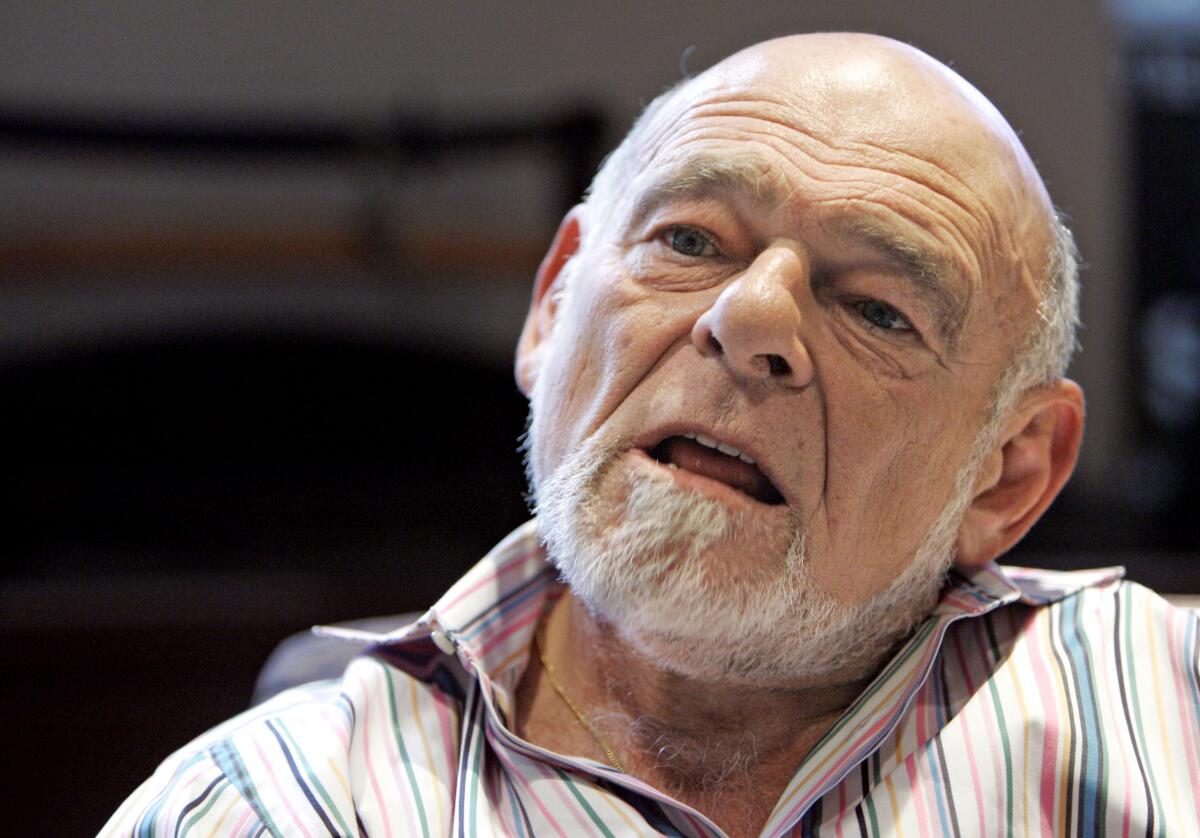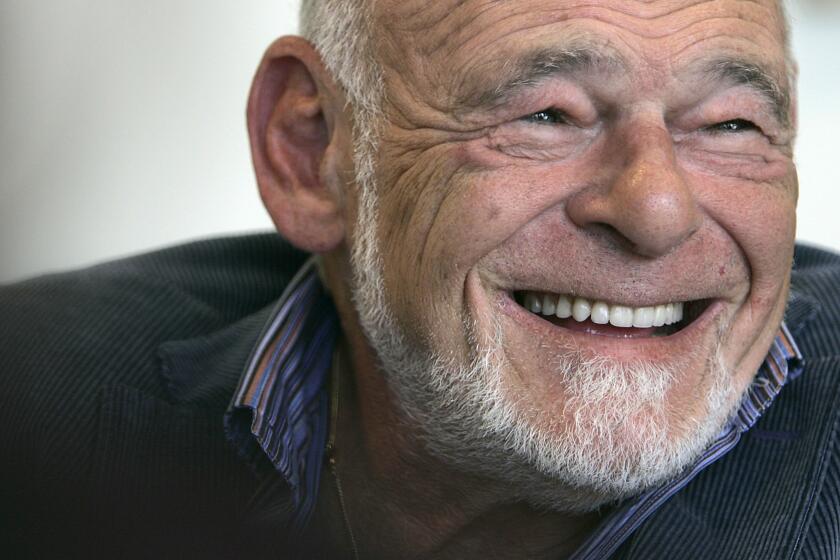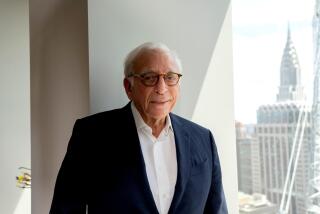Sam Zell, business tycoon whose purchase of L.A. Times led to financial disaster, dies

- Share via
Sam Zell, who made his billions resurrecting troubled businesses that ran the gamut from bicycles to real estate, has died at 81.
His death was announced by Chicago-based Equity Residential, the real estate company he founded.
Where others saw red ink, Zell saw potential value, calculated the risks and plotted a path to profit.
“You gotta dance around the edge,” the brash, bearded mogul, who delighted in calling himself “the Grave Dancer,” once wrote of his investment philosophy. “But you don’t fall in.”
Then came what he would later call “the deal from hell.”
More than a decade after Tribune Co. went private in a leveraged buyout that saddled the Los Angeles Times’ then-owner with $13 billion in debt and led to its bankruptcy, Sam Zell and dozens of former executives have agreed to pay $200 million to settle a lawsuit brought by unsecured creditors.
In 2007, Zell made national headlines when he acquired Tribune Co., a distressed media conglomerate that owned radio stations and major newspapers, including the Los Angeles Times and the Chicago Tribune. Believing that the newspaper business had a future, he rode in, promising innovation and reinvention.
Less than 12 months later, however, Tribune collapsed in what then was the largest bankruptcy in American media history. A new wave of turmoil hit the company’s venerable papers and caused 4,000 employees to lose their jobs during Tribune’s long slog out of insolvency.
Zell lost $315 million — his personal stake in the $8.2-billion transaction that made him an unlikely baron of the news business — but he retained his famous swagger.
“People tend to ask me about the Tribune like it was something equivalent to having lost a child,” Zell, who died Thursday in Chicago due to complications from a recent illness, told Crain’s Chicago Business in 2014. “I promise I never had any kind of emotions like that.”
Known for his bluejeans, foul language and love of motorcycles, the man Forbes once described as “one of America’s most creative dealmakers” strode into the newspaper world during a perilous time for the industry.
Billionaire Sam Zell, former owner of the L.A.
The internet was laying waste to a business model that had held up for more than a century, causing print readership and ad revenues to nosedive. Tribune, which in 2000 had purchased The Times and more than 30 other daily papers and television stations from Times Mirror Co., had been languishing on the auction block when Zell made a successful eleventh-hour bid.
The deal hinged on the creation of an employee stock ownership plan, or ESOP, a structure that would allow Tribune to avoid most federal income taxes. The ESOP would borrow the lion’s share of the $8.2-billion purchase price, adding greatly to the company’s already considerable debt.
Although Los Angeles billionaires Eli Broad and Ron Burkle expessed interest in acquiring Tribune, Zell, who maintained homes in Chicago and Los Angeles, became Tribune’s chairman and installed a cocky new management team to shake up what he saw as a moribund corporate culture.
“The challenge is, how do we get somebody 126 years old to get it up?” Zell told an auditorium full of Times employees shortly after gaining control. “I’m your Viagra, OK?”
Zell had no experience owning newspapers. But in other industries, particularly real estate, where his fortune started, he was an undisputed master of the turnaround, admired for his uncanny sense of when to buy and when to sell.
Sam Zell sues former Tribune shareholders
His biggest payday came the same year he bid on Tribune. He sold his Equity Office Properties Trust, the nation’s biggest office building landlord, to Blackstone Group for $39 billion just before the nation spun into recession in 2008. It was then the largest private equity deal in history.
“People in the industry want to know what his thinking is, and they look at it as they do their own strategic thinking,” Stan Ross, a real estate accounting specialist and former vice chairman of Ernst & Young who died in 2018, once said of Zell, whom he advised for years. “He is a visionary. It doesn’t mean he’s right every time, but he’s a visionary.”
Zell was entrepreneurial from an early age. He was barely out of grade school when he noticed a new magazine called Playboy, got his hands on dozens of copies and sold them to his friends for $3.
“I recognized a need common in all 13-year-old boys, saw a restriction on supply and I took advantage of it,” Zell told Forbes in 2013. “Fifty-odd years later I’m still doing the same thing.”
He was the son of Bernard and Ruchla Zielonka, who escaped Poland with their daughter Leah just before the Nazi blitzkrieg in 1939. They fled to Lithuania and crossed Siberia to Japan, where they managed to find passage to the United States.
They eventually settled in Seattle, where Zell was born on Sept. 28, 1941. The family later relocated to Chicago, where his father shortened the family name to Zell.
The senior Zell was a businessman who dealt in grain, jewelry and eventually real estate. He was demanding and opinionated, and so was his son. According to Greg Burns in the Chicago Tribune, Sam Zell’s quote in the 1959 Highland Park High School yearbook read: “I am not arguing with you. I am telling you.”
After high school he went to the University of Michigan, where he earned a bachelor’s degree in political science in 1963. While still an undergraduate, he got a job managing his 15-unit student apartment building. Teaming up with fraternity brother Robert Lurie, he moved from managing apartments to buying them. By the time Zell finished law school, in 1966, he was overseeing several thousand apartments and owned several buildings. He told Bloomberg that he practiced law for only four days before throwing all his weight into business dealings.
While in college, he married the first of three wives. His survivors include his wife, Helen, three children and nine grandchildren.
After law school, Zell briefly worked at a blue-chip Chicago law firm but found the work dull and financially unfulfilling. He opened a solo practice but continued to invest in real estate, snapping up distressed apartment buildings in small secondary markets such as Toledo, Ohio, and Tampa, Fla. He found a mentor and early backer in Hyatt Hotel founder Jay Pritzker, “the smartest guy I’ve ever met,” Zell told Barron’s in 2011, who “had an incredible grasp of the art of the deal.”
In the 1970s, Zell and Lurie began to diversify into office buildings such as Chicago’s landmark Field building, which they bought for $52 million in 1978 and sold for $94 million in 1981.
In 1976, Zell founded Equity Office Properties Trust, the first real estate investment trust to be traded as part of the S&P 500. A real estate investment trust enables the public to buy and sell shares of commercial real estate portfolios the same way they invest in other industries, and Zell’s use of it was revolutionary.
Zell “created the public real estate market,” Richard Green, Lusk chair in real estate at the USC Sol Price School of Public Policy, told The Times in 2020.
For Zell, a good deal had to meet three basic criteria: The property had to have high profit potential, an acceptable level of risk and a structure to minimize taxes. The latter requirement would land him in legal hot water.
In the 1970s, he led an investment group that wanted to acquire a $9-million apartment and hotel complex in Reno. The family that owned the property was reluctant to sell until Zell’s group came up with a plan to deposit part of the purchase price in an offshore account, thereby reducing the sellers’ tax bill. That transfer led to federal charges that Zell and his partners had conspired to defraud and impede the Internal Revenue Service.
Zell agreed to cooperate with federal prosecutors if they dropped the charges against him. As a result of his testimony at the 1977 trial, his brother-in-law, Roger Baskes, went to prison for two years and Zell went on to build his fortune.
His drive to make money eventually led him to diversify his portfolio. “The Grave Dancer” became a successful corporate raider, taking over radio stations, trailer parks, barges, wire and cable factories and garbage-fueled power plants.
One of his best-known deals involved Itel Corp., a rail-car and container leasing firm, which he took over in 1985 after it emerged from bankruptcy with $400 million in tax credits on its books. Zell as chairman methodically purchased other companies for Itel to operate that could share in its tax credits. He increased revenue through moves such as selling off a cargo container unit for a $250-million profit, and Itel’s stock tripled in value.
Zell made another shrewd purchase in 1991 when he spent $280 million on bankrupt Carter Hawley Hale Stores Inc., a Los Angeles-based department store chain. Four years later, he sold the still-struggling retail giant to Federated Department Stores Inc. for $373 million.
The short (just over 5 feet tall), craggy-faced tycoon stormed boardrooms like the proverbial bull in a china shop. At an early Itel Corp. meeting, he reportedly flicked cigarette ash over his chair and grounded the butt into the pristine carpet.
“Zell is a helluva asset manager, but he’s a brusque sort of man and not very genteel,” Herbert Kunzel, Itel’s retired chairman, told the New York Times in 1991.
After closing the sale of Equity Office Properties Trust to Blackstone Group, Zell began the negotiations that led to the leveraged buyout of Tribune, whose assets included 25 TV stations and the Chicago Cubs as well as nine daily newspapers. Among the papers Tribune owned, in addition to the Los Angeles Times and the Chicago Tribune, were the Baltimore Sun, Newsday, the Orlando Sentinel and the Hartford Courant.
“I’m sick and tired of listening to everyone talk about and commiserate over the end of newspapers,” Zell told the Wall Street Journal in 2007. “They ain’t ended and they’re not going to end. I think they have a great future.”
After successive waves of budget cutting under Tribune, many employees were hopeful that Zell could stop the bleeding and save the company.
“Sam Zell was sort of a rock star when he went around and toured the various properties,” Ann Marie Lipinski, who quit as editor of the Chicago Tribune less than a year after Zell’s takeover, told the New York Times in 2010. “People had been living with uncertainty for so long and they hoped something good would come from an owner with a proven track record of success in other businesses.”
But Zell quickly disabused them of that hope. At a meet-and-greet session with Tribune employees, he spoke about the need to shake up the corporate status quo to increase revenue. He expressed no reverence for traditional journalistic values.
When a photographer at the Orlando Sentinel questioned his commitment to serious news — “We’re not the Pennysaver, we’re a newspaper,” she said — he capped his response with an acerbic “F— you.”
Nor did he try to charm reporters and editors during a visit to the Tribune papers’ Washington bureau. “This is the first unit of the Tribune that I’ve talked to that doesn’t generate any revenue. So all of you,” he said, “are overhead.”
One of the most tangible signs of Zell’s determination to change Tribune’s cultural dynamics was installed at the company’s Chicago headquarters: a multi-legged statue he dubbed the “bureaucratic shuffle.” Another not-so-subtle message was the acronym printed on employee badges: “A.F.D.I.,” which stood for “Actually Friggin’ Doing It.”
Zell chose Randy Michaels as Tribune’s new chief executive, a former shock jock who had headed Zell’s Jacor Communications radio group (later sold to Clear Channel Communications). Known to share Zell’s nonconformist tendencies, he had a flair for marketing that pushed the boundaries of good taste. The former DJ once used his airtime to pretend to puree a live frog — the mascot of a rival radio station — in a blender.
Michaels installed former associates from the radio world in top management, even though newspapers made up the bulk of Tribune’s business. One of his hires was former radio programmer Lee Abrams, who, as Tribune’s new chief innovation officer, flooded employees’ inboxes with long-winded and disjointed emails that were riddled with typos. One of his most memorable missives expressed surprise that reporters covering the Iraq war were actually in Iraq.
The new managers moved quickly to disrupt business as usual. A few months after taking charge, they wrapped The Times in a fake front page that was actually an ad for Disney’s “Alice in Wonderland.” Similar pages were later sold to Universal and NBC. Those decisions rankled the paper’s rank-and-file and elicited a formal letter of protest from the Los Angeles County Board of Supervisors, which said the advertising ploys made “a mockery of the newspaper’s mission.”
Across Tribune’s papers, circulation and revenues continued to decline at a far faster pace than Zell had anticipated. Although he had said he wouldn’t cut staff, jobs and budgets were slashed across the company as the economy began to tank. Assets were sold, including Newsday. Top editors who resisted the Zell team’s decisions were forced out, including Lipinski at the Chicago Tribune and James O’Shea at The Times.
“I had never witnessed anyone quite like Zell who, I would soon learn, was one of those media executives who voiced more concern about the first quarter than the First Amendment,” O’Shea wrote in the Guardian in December 2008 after Tribune filed for Chapter 11 protection.
The company entered bankruptcy proceedings with $7.6 billion in assets and $12.9 billion in debt, most of which stemmed from the loans made to complete Zell’s buyout. Staff cuts mounted while top executives received lavish, court-approved bonuses that totaled $57.3 million.
Abrams was terminated in October 2010 after sending a companywide email with pornographic content. Michaels resigned about 10 days later, after denying a story in the New York Times that he had told a group of Tribune executives to “watch this” as he offered a Chicago waitress $100 to bare her breasts.
“They threw out what Tribune had stood for, quality journalism and a real brand integrity, and in just a year, pushed it down into mud and bankruptcy,” newspaper analyst Ken Doctor said.
Zell’s fortune remained largely intact, thanks in part to a widening portfolio of international investments. But the fall into bankruptcy was a blow to his reputation as “the Grave Dancer” who never stumbled.
In some remarks he seemed more upset about the bad publicity he received than the money he lost.
“The media loves nothing more than to cover the media,” he told Forbes in 2011. “That’s fine for the media. ... I just don’t need to be the media’s bitch anymore.”
Woo is a former Times staff writer.
More to Read
Start your day right
Sign up for Essential California for the L.A. Times biggest news, features and recommendations in your inbox six days a week.
You may occasionally receive promotional content from the Los Angeles Times.







